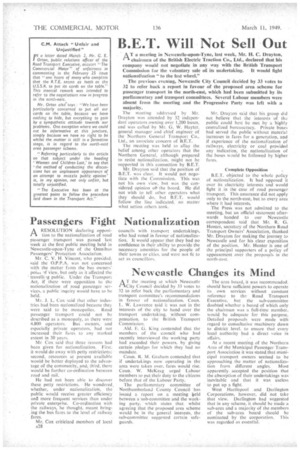• Passengers Fight
Page 4

If you've noticed an error in this article please click here to report it so we can fix it.
ARESOLUTION declaring opposition to the nationalization of road passenger transport was passed last week at the first public meeting held in Newcastle-upon-Tyne of the Omnibus Passengers' Protection Association.
Mr. C. V. H. Vincent, who presided, said the 0.P.P.A. Wits not concerned with the matter from the bus owners' pOiu :af view, but only as it affected the " travelli ig public. Under the Transport Act, if there were opposition to the nationalization of road passenger services, a-public inquiry would have to be held.
Mr. J. L. Cox said that other industries had been nationalized because they were said to be monopolies. Road passenger transport -could not be described as a monopoly, as there were 4,800 operators. Bus owners, and especially . private operators, had not increased their fares. to imy marked extent in 30 years. _
Mr_ Cox said that three reasons had been given for nationalization. First. it would do away with petty restrictions; second, resources at present available would be better deployed to the advantage of the community,. and, third, there would be further co-ordination between road and rail.
He had not been able to discover these petty restrictions: -He wondered. whether, . under nationalization, the public would receive greater efficiency and more frequent services than under private enterprise. Co-ordination with ' the railways, he thought, meant bring, ing the bus fares to the level of railway fares.
Mr. Cox criticized members of local n28


























